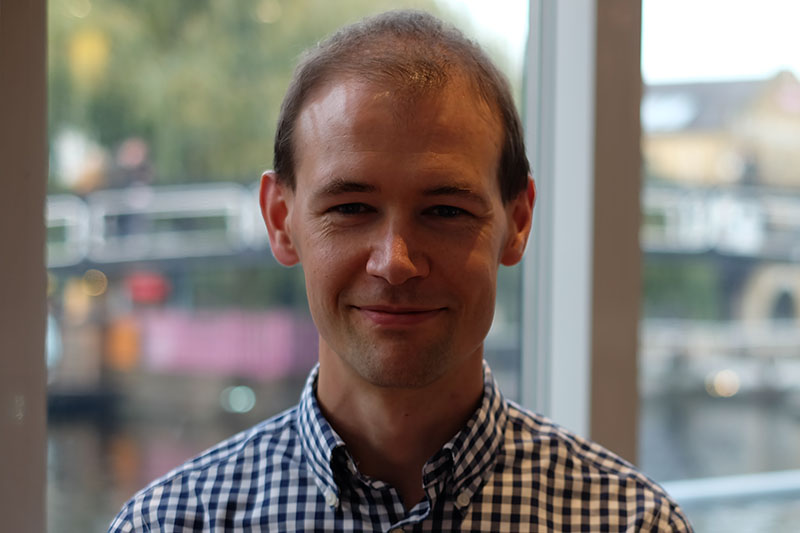Home » Breathing new life into beta cells – senior research fellowship project
Breathing new life into beta cells
Dr James Cantley’s Senior Research Fellowship project
Home »
Dr James Cantley’s Senior Research Fellowship project

Dr James Cantley is a diabetes researcher at the University of Dundee. He is one of the Senior Research Fellows for the Type 1 Diabetes Grand Challenge and specialises in beta cells, the insulin-producing cells in the pancreas. His Grand Challenge research project aims to identify, develop and test new treatments to grow new beta cells, and encourage surviving beta cells to replicate directly in the pancreases of people with type 1 diabetes.
The insulin-producing beta cells in the pancreas are destroyed by the immune system in type 1 diabetes. New treatments are urgently needed to restore beta cell function in people with type 1 so they can make their own insulin again.
James’ research will bring us closer to new treatments to encourage beta cell growth in people with type 1 diabetes. It is hoped these treatments will reverse the lack of insulin in type 1 diabetes. Plus, unlike transplanting lab-grown or donor beta cells, a person’s own regrown beta cells wouldn’t be rejected as foreign cells. This means people receiving this treatment wouldn’t need to take immunosuppressant drugs, which can have dangerous and unwanted side effects. At the end of his fellowship, James hopes to have found drugs that encourage beta cells growth, and which are suitable for testing in clinical trials of people with type 1 diabetes.
Researchers know of some biological processes that drive beta cell growth, but there are gaps in their understanding. In his fellowship, James will try and bridge these gaps. First, he and his team will identify potential drugs (or chemical starting points for drugs) which prompt beta cell growth. The researchers will then switch on and off genes and proteins important for beta cell growth to understand how these drugs work.
Then, they will test the most promising ones in animal and human cells in their lab. Next, they will give the most effective drugs to mice with type 1 diabetes to test whether they can increase insulin production and help to manage blood glucose levels.
As well as studying ways to activate the growth of new beta cells, James will also explore whether it’s possible to clone existing beta cells. In people with type 1, a small number of beta cells sometimes survive the immune attack. A drug being tested for Alzheimer’s disease may be able to help these remaining beta cells multiply. James will give this drug to mice with type 1 to see if it can stimulate their surviving beta cells to multiply and make insulin. James hopes this drug could be used alongside beta cell regeneration drugs to boost beta cell numbers.
Dr James Cantley said:
“Regenerating beta cells in the pancreas has the potential to revolutionise the treatment of type 1 diabetes, by replacing cells destroyed by the immune attack, and ultimately leading to stable blood sugar levels and a life free from insulin injections. However, there are many obstacles to developing successful therapeutic strategies.
“To overcome these, I have put together an ambitious, future-focused project and an outstanding international team of scientists which, with the support and funding from the Type 1 Diabetes Grand Challenge, will enable us to focus on our mission of identifying new strategies to drive beta cell regeneration in the pancreas. We are on the cusp of a new era of type 1 diabetes treatment, and I can’t wait to see where this research takes us.”